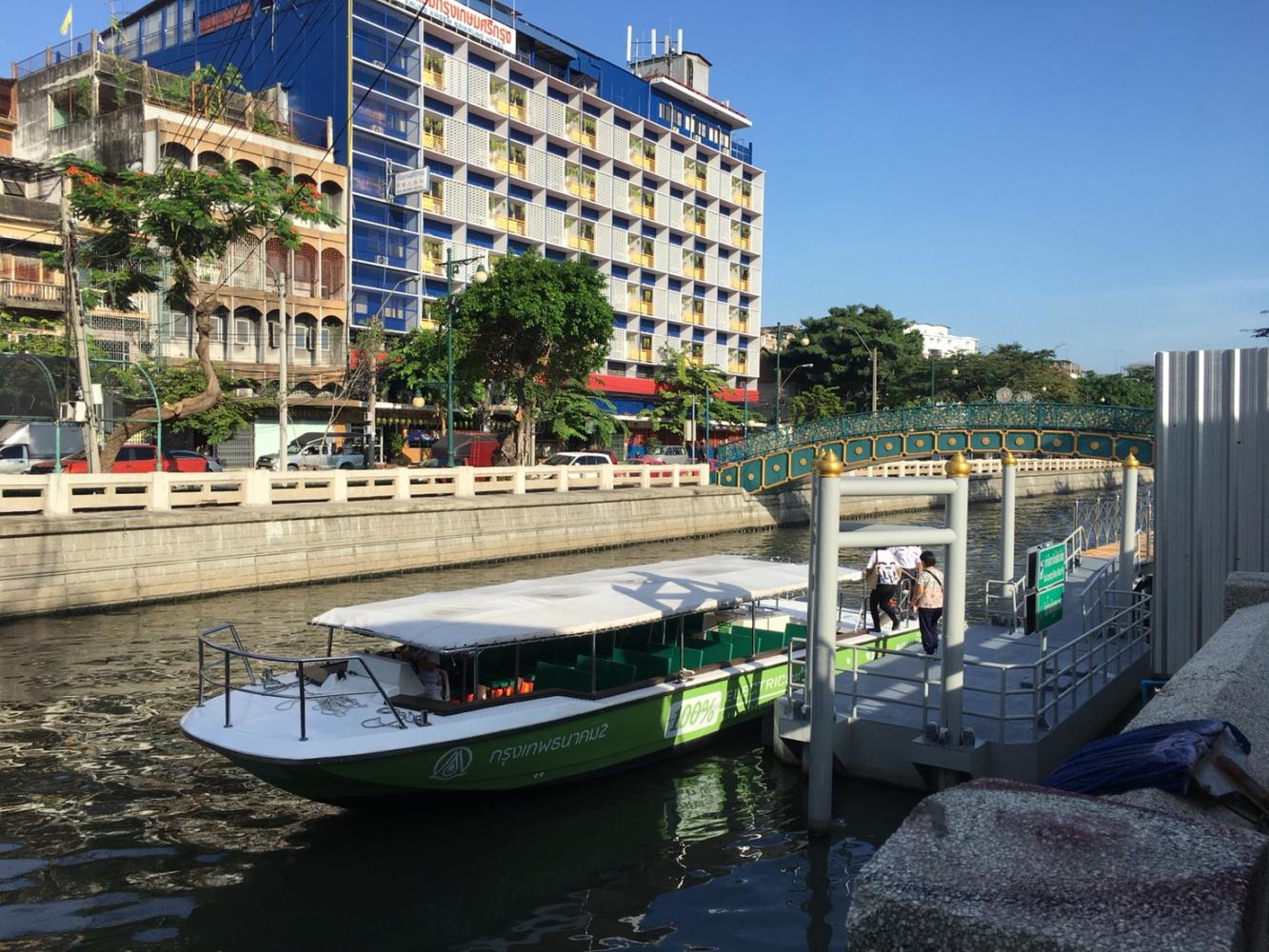
Covid-19 may have brought most social activities and businesses to a halt, but the government's march to develop Thailand's transport infrastructure pushes on.
For example, the Ministry of Transport decided to take advantage of the absence of passengers to upgrade Bangkok's Don Mueang airport, so it could better serve travellers once the outbreak subsides. But most recently, the Bangkok Metropolitan Administration (BMA) on March 30 approved a plan to purchase electric boats to serve commuters along Khlong Phadung Krung Kasem in Bangkok's Old Town.
Electric boats aren't as noisy as diesel-fuelled boats and they won't belch black smoke, officials said. The purchase is a part of BMA's plan to revitalise public transportation along Bangkok's canals, the feasibility study for which was completed by BMA's Transport Policy Office last month.
Sakoltee Phattiyakul, deputy Bangkok governor who oversees this canal transport project, said the new electric boat service will be operated by the BMA's investment arm, Krungthep Thanakhom (KT), which will receive 117 million baht to run the service along Khlong Phadung Krung Kasem.
Some of the money will go towards procuring seven 30-seat electric boats, which will run along existing, diesel-engined boats. Deputy governor Sakoltee said the diesel boats will be subsequently decommissioned.
Mr Sakoltee said the electric boat service will launch in November, and KT will operate the service for 660 days. Afterwards, he said, BM will launch a tender to select a private operator to run the service.
"The service will initially be free-of-charge, but after three months we will start collecting fares," he said. "We are still figuring out the appropriate ticket price, by asking current users and taking into account investment costs."
"The feasibility study suggests that fares should range between 5-10 baht per trip. We expect 600 people will use the service each day, assuming Covid-19 subsides," he said.
NOT JUST FOR COMMUTERS
"The new boats, measuring 10 metres long and three metres wide, are made of fibreglass," said Panurak Klannurak, director of Transport Policy Office. "Each boat will also have one seat reserved for wheel-chair users."
The boats will cruise at between 15-20 kilometres per hour to minimise wake and prevent erosion along canal embankments. The whole 5-km trip will take about 30 minutes to complete, and the boats are able to run for 10 hours on a single charge.
"More boats mean we can provide a more frequent service," said Mr Panurak, before adding the new additions will shorten passenger waiting time to 7-10 minutes -- down from 20-30 minutes at present.
While a single charge does take eight hours, the boats won't give off noise and PM2.5 pollutants like their diesel counterparts -- which is hoped to attract tourists.
"The service isn't focused on just local commuters," said Mr Sakoltee. "We have our eyes on local and foreign tourists who will use this service to connect with the city's electric train network, as well as the Chao Phraya River boat services."
Mr Sakoltee went on to say that Khlong Phadung Krung Kasem service is perfect for sightseeing trips as the canal is lined by major historic buildings and temples.
"The canals are dotted with piers which lead to five historic communities across Bangkok. Tourists can also use this route to go to Khao San Road," he said.
CANAL REVIVAL
Khlong Phadung Krung Kasem was once a major transportation route, but it fell into disuse and disrepair just over half a century ago.
The idea to revive the canal as a transport route came in 2014, not long after then-junta leader Prayut Chan-o-cha opened a Pracharath Market along the canal just behind Government House.
He ordered the BMA to start passenger services along Khlong Phadung Krung Kasem, as on one end, the canal is linked to the Chao Phraya River, while on the other, it passes nearby Hua Lamphong train and MRT station.
The route, which connects Chao Phraya River and Hua Lamphong and Rama IV areas via Theves Pier, officially opened in September 2016. Services began with four diesel-engined barges provided by the BMA.
On weekdays, free services run between 6-9am and 4-8pm, with boats departing every 20 minutes. On weekends and national holidays, boats run between 8am-8pm, with departures every 30 minutes.
The service's increasing popularity pushed the BMA to build two more piers along the canal last year. It also added more boats to serve more passengers -- including a 40-seater boat, six 12-seater boats and one 40-seater electric boat.
UNTAPPED POTENTIAL
With about 1,161 canals stretching some 2,272km within its limits, Bangkok was originally envisioned as a canal town, with the capital's waterways service as its main transport route.
However, only three waterways in the city are currently served by river transportation -- namely the Chao Phraya River, Khlong Saen Saep and Khlong Phasi Charoen.
Today, the only canal that still sees heavy daily traffic is Khlong Saen Saep, which has a boat service that runs from Bang Kapi along Phetchaburi Road to Phan Fah Bridge in the Old Town.
Khlong Phasi Charoen also has a boat service which runs from Phet Kasem 49 Pier to Wat Paknam Phasi Charoen Pier. The 11km-long route began operations a few years ago, but recently the BMA built a walkway access from Taksin-Phet Kasem Pier to Bang Wa Station of the BTS skytrain.
Meanwhile, the Chao Phraya Express Boat, which runs from Nonthaburi to Thanon Tok along the Chao Phraya River, has served commuters for more than 40 years. For the past 15 years it has functioned as a feeder for the BTS skytrain at Sathorn Pier, which is connected to Saphan Kwai station.
While tourists take it for sightseeing, the boat is indispensable to thousands of commuters who live in Bangkok's northern suburbs.